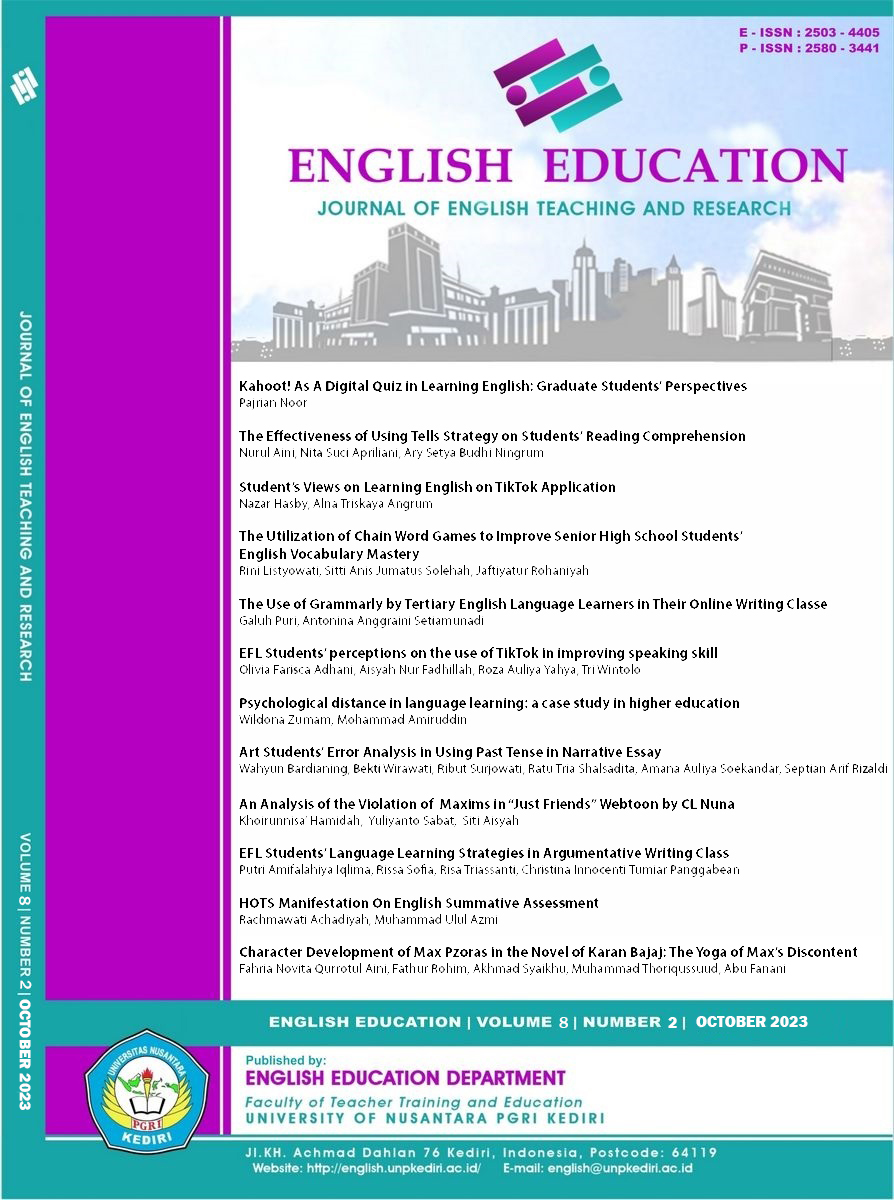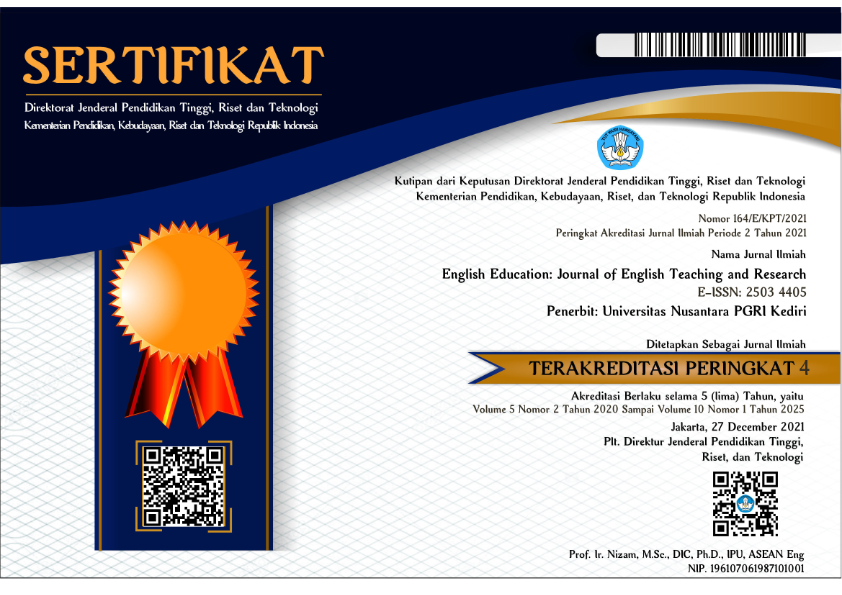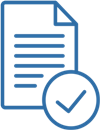EFL Students' Language Learning Strategies at Argumentative Writing Class at UNIROW Tuban
DOI:
https://doi.org/10.29407/jetar.v8i2.20968Keywords:
EFL Students, Language Learning Strategy, Argumentative Writing ClassAbstract
The focus of this research is on EFL students’ language learning strategies used in Argumentative Writing class at UNIROW Tuban. It sought to determine the students’ most frequent language learning strategies and the strategies’ distinctions between students, both male and female. The descriptive qualitative was employed as the design of research for this study. The study's participants are 15 EFL students enrolled in Argumentative Writing class from English Language Education department undergraduate program of UNIROW Tuban. The questionnaire and interview data were qualitatively examined using Oxford's (1990) theories of language learning. It was identified that there were six kinds of language learning strategies used by the students, namely memory strategies, cognitive strategies, compensation strategies, metacognitive strategies, affective strategies, and social strategies. The findings showed that in the Argumentative Writing class, both genders of students most frequently employed cognitive strategies (30,1%). Additionally, it was discovered that female students (23,5%) employed more varied language learning strategies than male students (22,5%). The cognitive strategies appear to be the finest support strategies employed in Argumentative Writing class that can overcome students' writing limitations.
Downloads
References
Astrini, N.W.F., Ratminingsih, N.M., & Utami, I.G.A.L.P. (2020). The Model of Strategies Employed by English Teachers in Teaching Writing Skill in National Plus Schools. Journal of Educational Research and Evaluation, 4(1), 59-62.
Bai, B., & Guo, W. (2021). Motivation and Self-Regulated Strategy Use: Relationships to Primary School Students’ English Writing in Hong Kong. Language Teaching Research, 25(3), 378-399.
Bai, R., Hu, G., & Gu, P. Y. (2014). The Relationship Between Use of Writing Strategies and English Proficiency in Singapore Primary Schools. The Asia-Pacific Education Researcher, 23(3), 355-365.
Bessai, N. A. (2018). Using Oxford’s Strategy Inventory of Language Learning (SILL) to Assess the Strategy Use of a Group of First and Third Year EFL Algerian University Students. American Scientific Research Journal for Engineering, Technology, and Sciences (ASRJETS), 42(1), 166-187.
Cresswell, J. (2002). Research Design: Qualitative, Quantitative and Mixed Method Approaches. London: Sage.
Fajrina, D., Everatt, J., & Sadeghi, A. (2021). Writing Strategies Used by Indonesian EFL Students with Different English Proficiency. Language Teaching Research Quarterly, 21, 1–15.
Flowerdew, J. (1999). Problems in Writing for Scholarly Publication in English: the Case of Hong Kong. Journal of second Language Writing, 8(3), 243-264.
Flower, L., & Hayes, J.R. (1981). A Cognitive Process Theory of Writing. College Composition and Communication, 32(4), 365-387.
Gay, Mills & Airasian. (2012). Educational Research: Competencies For Analysis and Applications. Boston: Pearson Education, Inc.
Gerami, M.H., & Baighlou, S.M.G. (2011). Language Learning Strategies Used by Successful and Unsuccessful Iranian EFL Students. Procedia - Social and Behavioral Sciences, 29, 1567 – 1576.
Getie, A.S. (2020). Factors Affecting the Attitudes of Students Towards Learning English as a Foreign Language. Cogent Education, 7(1), 1738184.
Hidayad, F., & Puwanto, M.P. (2022). English Learning Strategies for Vocabulary Mastery. Journal of English Teaching and Research, 7(2), 178-189.
Hong-Nam, K., & Leavell, A. G. (2006). Language Learning Strategy Use of ESL Students in an Intensive English Learning Context. System, 34(3), 399-415.
Junianti, R., Pratolo, B.W., & Wulandari, A.T. (2020). The Strategies of Learning Writing Used by EFL Learners at a Higher Education Institution. Ethical Lingua, 7(1), 64-73.
Khoshsima, H. & Tiyar, F.R. (2015). Language Learner Strategies for Building EFL Learners' Autonomy. International Journal of English Language and Translation Studies 3(4), 60-73.
Kvale, S. (1996). Interviews: An Introduction to Qualitative Research Interviewing. Thousand Oaks, Calf: Sage Publication.
Mack, N., Woodsong, C., Macqueen, K.M., Guest, G., & Namey, E. (2005). Qualitative Research Methods A Data Collector’s Field Guides. North Carolina: Family Health International.
McMullen, M. G. (2009). Using Language Learning Strategies to Improve The Writing Skills of Saudi EFL Students: Will It Really Work? System, 37(3), 418-433.
Muljanto, S. (2012). Analysis of Barriers in Listening Comprehension Among Junior High School Students. English Review, 1(1), 78-85.
Nambiar, R. (2009). Learning Strategy Research – Where Are We Now? The Reading Matrix: An International Online Journal, 9(2), 132-149.
Panggabean, C.I.T., & Triassanti, R. (2020). The Implementation of Metacognitive Strategy training to Enhance EFL Students Oral Presentation Skill. Journal of English Teaching and Research, 5(1), 32-40.
Sapitri, R. (2017). Cognitive Process of the Students in Writing Argumentative Text. Journal of English Teaching and Research, 2(1), 9-20.
Oxford, R.L. (1990). Language Learning Strategies: What Every Teacher Should Know. New York: Newbury House.
Oxford, R.L., & Nyikos, M. (1989). Variables Affecting Choice of Language Learning Strategies by University Students. Modern Language Journal, 73, 291-300.
Rianto, A. (2020). A Study of Language Learning Strategy Use Among Indonesian EFL University Students. Register Journal, 13(2), 231-256.
Yuliani, I. & Fadhly, F. Z. (2020). Learning through Learners: Indonesian EFL Learners’ Writing Strategies Experiences. Indonesian Journal of Learning and Instruction, 3(2), 101-110.
Downloads
Published
Issue
Section
License
Authors who publish with this journal agree to the following terms:
- Copyright on any article is retained by the author(s).
- The author grants the journal, the right of first publication with the work simultaneously licensed under a Creative Commons Attribution License that allows others to share the work with an acknowledgment of the work’s authorship and initial publication in this journal.
- Authors are able to enter into separate, additional contractual arrangements for the non-exclusive distribution of the journal’s published version of the work (e.g., post it to an institutional repository or publish it in a book), with an acknowledgment of its initial publication in this journal.
- Authors are permitted and encouraged to post their work online (e.g., in institutional repositories or on their website) prior to and during the submission process, as it can lead to productive exchanges, as well as earlier and greater citation of published work.
- The article and any associated published material is distributed under the Creative Commons Attribution-ShareAlike 4.0 International License








 Article template
Article template



